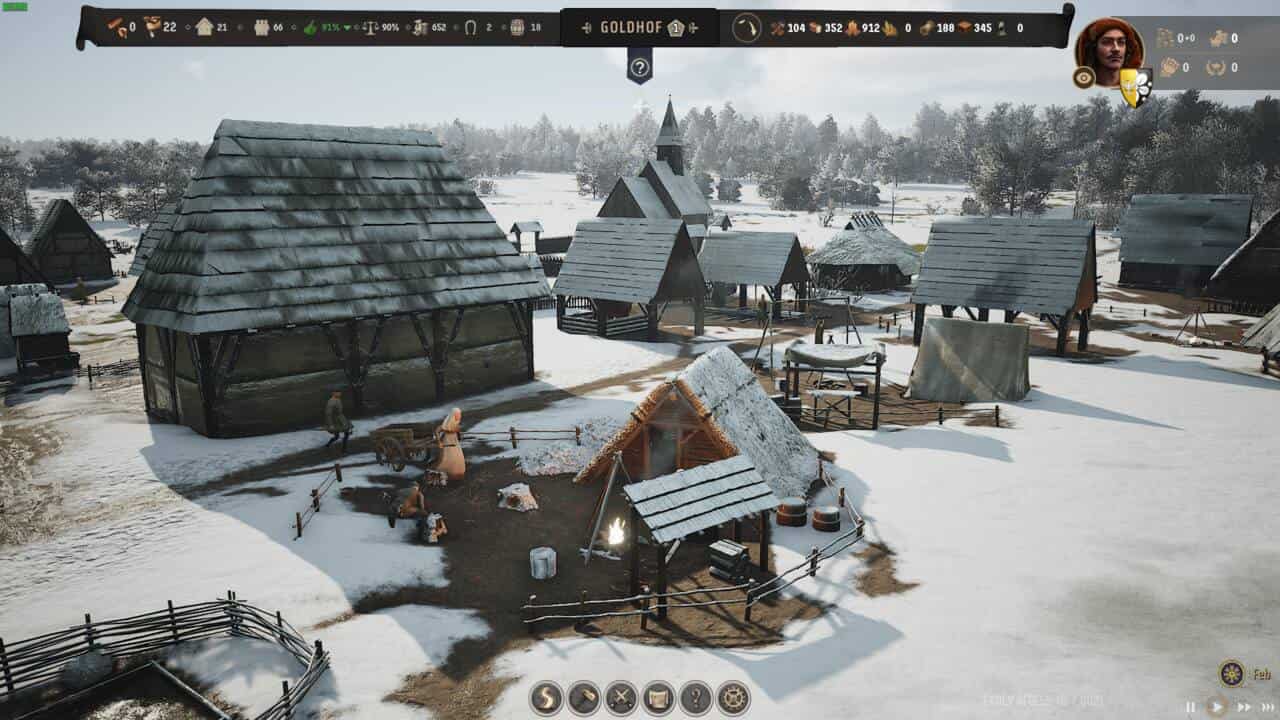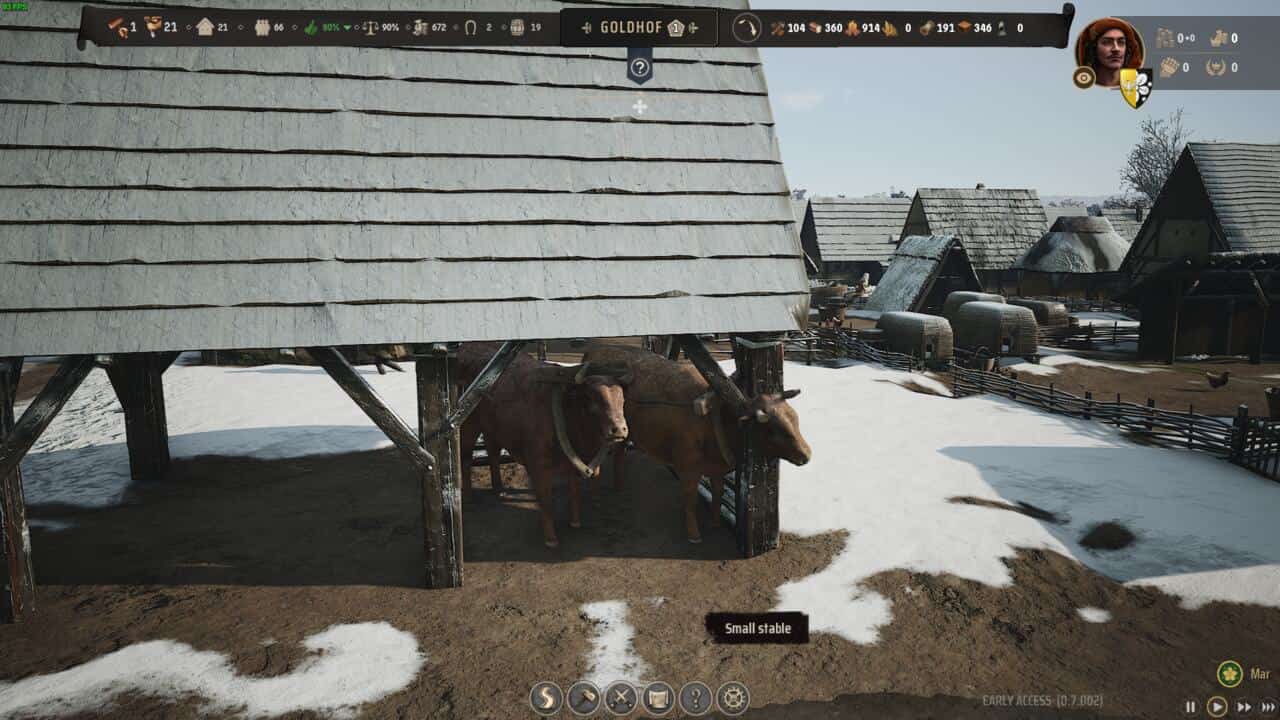Video Gamer is reader-supported. When you buy through links on our site, we may earn an affiliate commission. Prices subject to change. Learn more
- Play on Relaxed difficulty to start
- Prioritise food and fuel first
- Logging Camps and Woodcutter’s Camp gather timber and firewood, respectively
- Always have an unassigned Family available for construction work
- Order a second ox as soon as possible
- Understand how seasons work
- Build several small marketplaces near burgage plots
- Max out workers at the Granary and Storehouse
- Use Development Points wisely
- Build burgage plots large enough to have extensions
- Play slow
Manor Lords is tough, a likely nod to the historical period it’s inspired by, and firing it up for the first, gleeful at the prospect of some cosy city-building, can be a bit of a wake up call, and possibly even a tad demoralising. Manor Lords is challenging in part because of its complexity; nothing is simple and surviving banks on juggling production, warfare, regional finances, and the happiness of your villagers. But, that’s also what makes it so enjoyable and with our Manor Lords tips and tricks you’ll hit the ground running.
Set the difficulty to Relaxed for your first game
Manor Lords is complex, even by city-building standards, with lots of moving parts and interlinking production chains, droughts, bandits, belligerent neighbouring fiefdoms, and much more. It can all get a bit overwhelming very quickly. To ease yourself in, set the difficulty to Relaxed. This will remove negative weather events, remove bandit raids, give you more starting resources, reduce villager requirements, and allow you to place wells anywhere among other other gentle softeners. Once you’ve got to grips with the basics, you can jump into a fresh save and up the difficulty as required.
Food and fuel then the rest
With sprawling forest, fertile fields, gleaming iron ore deposits, and even the odd bandit camps begging for your attention, it can be tempting to want to do everything when you first dive into Manor Lords. Resist the urge. Instead, use your starting allocation of resources to build up a stockpile of wood and firewood, both vital to keep your settlement ticking over while you expand. A solid start is key to success in Manor Lords.
The buildings you’ll want to construct first are a Woodcutter’s Lodge, Forager Hut, Hunting Camp, Logging Camp, Storehouse, Granary, and then five burgage plots to give your homeless starter families somewhere to stay. From there, let things tick over for a few months while you build up a nice buffer of food and fuel. After that, graduate to farming by building a Farmhouse and several wheat farms. These will yield grain that you can mill into Flour at the Windmill and then bake into bread at a Communal Over.

Learn the difference between a Logging Camp and a Woodcutter’s Camp
During our first game of Manor Lords, we were systematically hit with a worrying pop-up warning us that our Firewood stockpiles were dangerously low, hinting at imminent disaster. We had a Logging Camp so what was the problem? After some sleuthing, we realised that the Logging Camp and Woodcutter’s Camp serve two very distinct functions. Don’t make the same mistake (and read building descriptions before building them, unlike us). The Logging Camp sources Timber, used for building and the production of Planks, while Woodcutter’s Camp gathers up Firewood, the fuel villagers need to stay toasty in their burgage plots and certain buildings require to stay productive.
Always have an Unassigned Family
If you hover over the leftmost icon of the toolbar at the top of the screen, you’ll see how many unassigned families you have in your settlement. Rather than loitering at the local tavern, these families play a crucial role: they’ll pick up any construction work and also guide oxen to transport timber. You’ll always want to have at least one unassigned family at all times to construct any new buildings otherwise you’ll quickly find that your settlement is peppered with unfinished building sites.

Get more Oxen as soon as possible
Manor Lords doesn’t do a very good job of signalling to the player just how important the humble ox is to the prosperity of your settlement. Oxen ferry building materials from production buildings to construction sites; they can be used to drastically speed up farming; and can even lend a hand at Logging Camps to drag Timber back from the forest.
As you expand, your starting ox might start to feel a little overwhelmed, pulled here and there with a mounting list of tasks. To mitigate this and up construction efficiency, order in a new ox as soon as your Regional Wealth coffers allow it.You can do this at Hitching Post or Livestock Trading Post if you have one. Remember to give them a place to rest as well by upgrading your Hitching Post to a Small Stable.
Marketplace placement matters
Marketplaces ensure villagers have access to the goods they need, and by extension, meet the residential requirements and keep you’re approval high. However, placement is important as market stalls don’t reach all that far when it comes to servicing burgage plots. One big market at the center of town might service burgage plots that are close-by but leave more distant houses with enough food, clothes, and fuel. To counter this, build smaller markets dotted around your city, ideally in the middle or close to several burgage plots.
Surviving winter
Seasons play a big part in Manor Lords and it’s good to get to grips with what they mean, especially winter. So the basic gist is that as the snow arrives, everything gets pretty bleak – berries stop growing, farms are useless, vegetable patches wither away, and if you haven’t stockpiled things can get pretty tough. Plan ahead to survive the first year winter by making sure to make the most of the summer months. Make sure your farms are growing at full capacity. Pay attention to fertility and farm placement. Don’t hesitate to import a few extra goods in October and November to tide you over until the spring.

Staff up your Granary and Storehouse
Manor Lords is a game that works in real-time, in the sense that everything that’s grown, mined, harvested, gathered, or produced needs to be physically transported by a villager. You can track a single village to see this in action. What this means is that you’ll need to give your settlement the best chance possible to keep the flow of goods and food going between buildings. The best way to do this is to max out the worker slots at the Granary and Storehouse to improve logistics efficiency.

Use Development Points wisely
Development Points are basically upgrade tokens awarded every time you reach the next Settlement Level. If you tap on the name of your settlement at the top of the screen, you’ll access the tech tree, packed with alluring little bonuses to everything from farming to armor making. For better or for worse, the Early Access build is capped at six Development Points.
Hold off on spending them as they come in until you get a better idea of how you want to specialise your economy. There’s no use unlocking Trapping if you plan on getting most of your food from farming. Nor does it make sense to invest in Basic Armormaking if you don’t plan on waging war.
Build burgage plots large enough to have extensions
When deciding the plot points for your burgage plots, make them large enough to have an extension. When deciding the plot points for your burgage plots, make them large enough to have an extension. The plot is large enough for an extension when you see backyard section represented by a hammer under a roof. At level 1 burgage plots, can turn these extensions in a Goat Shed to produce Hides, a Vegetable Garden to grow vegetables, and a Chicken Coop to collect eggs. From level 2 onward, you can assign extensions to become artisan workshops like a Blacksmith, Bowyer, Brewery, Tailor, Cobbler, and Joiner. Unlock the right Developments and you can build Armormaking and Bakery extensions, too.
Go slow, my lord
Overall, the city-building genre errs on the slower side compared to, say, an FPS or an action-RPG. Manor Lords take this even further and is a real slow burner. It rewards you for playing slow and meticulously. So take the time to let your settlement develop progressively. Don’t rush into overdoing it as you’ll likely stumble, run out of resources, and botch the whole thing. And, don’t forget to march around in your flowing red cloak in third-person view when you can. It’s a purely cosmetic feature, but it sure is fun.

